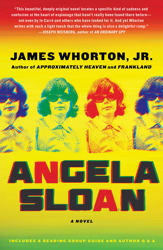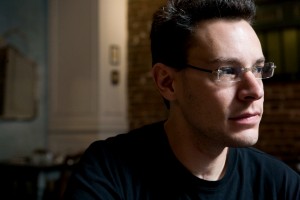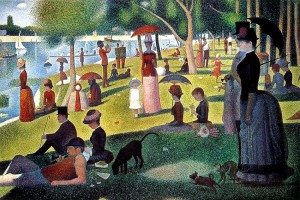 Katrina Gray: I’m wondering about the name of your group. Is horror tapping us, or are we tapping horror?
Katrina Gray: I’m wondering about the name of your group. Is horror tapping us, or are we tapping horror?
Brianne Baxtali: I always imagined it like sticking a spigot into what amounted to the very worst tree ever imagined, collecting the sap, and manufacturing it into a viscous substance to pour over tasty pancakes.
But Horrortap is a whole bunch of horrible trees, so maybe the group is a lot more like Canada than previously assumed. If that’s the case, Horrortap should have its own flag instead of a still from The Cabinet of Dr. Caligari.
I see your group calls for work characterized by psychological terror. I’m thinking Poe, Lovecraft, Oates, but I imagine that psychological terror could be an undercurrent in some literary fiction. The definition has the potential to be broad. What is your idea a story that belongs in Horrortap?
Do you know the Four a.m. Feeling? It’s when faces pop out of the static on the television and the Emergency Broadcast guy suddenly starts talking back. Or when the shadows start creeping longer than the taut string that has abruptly been loosened from your spine so your limbs feel slack. Or the exact moment you discover that your childhood boogeyman is starring in an entire YouTube serial. Or the hyenas that stalked our earliest ancestors are at your door, demanding to tear your DNA to shreds with ghostly warbles that shake the night like a seizure.
The Four a.m. Feeling is that something has shifted, and reality is not the way you had left it minutes ago. And it’s most assuredly four a.m. at Horrortap.
There has recently been discussion about looking for psychological disturbances in students’ stories since a writing professor revealed she’d had concerns about the anger conveyed in the Virginia Tech shooter’s assignments. It seems that in some cases, a writer’s freedom of expression is at odds with an outsider’s instinct that a writer is revealing a serious disturbance. Do you or any of your horror-writing contemporaries worry about exposing something deep and visceral in your work, for fear of how you might be perceived personally?
I don’t know if I can comment on the Virginia Tech shooter. I don’t know enough about him, personally. I don’t know enough about the case. Obviously, he was ill. I’m sure there were a lot of red flags that weren’t related to writing. I’m not sure what else to say; I can’t speculate on somebody I didn’t know.
Instead, I’m going to relate this in an attempt to answer the larger part of the question: This past year, I lived through my own horror movie. I was the victim of a pretty intense stalker. It’s not over yet because I still have to go back to court later this month. I still have a lot of trouble even talking about it.
This guy used to be my friend. I knew him for years. That’s why I felt safe enough to have him as a roommate. It turns out he wanted a relationship, and it didn’t matter how many times I said no – that wasn’t good enough. He got it in his head that if he couldn’t have me all for himself, nobody could, and that’s a dangerous way to think. So, he started harassing my friends and family via Facebook, email, and text. He would follow me whenever I left the house. I felt extremely uncomfortable. But my mother, the Queen of Bad Advice, told me I was just being paranoid. Whatever.
He kept finding out things about me, things I worked so hard to keep secret. I couldn’t figure out how he was doing it. Then, four days before I was set to move out, I got an anonymous letter in the mail: He had apparently put a keylogger on my computer. In addition, he had cameras throughout the apartment and had been filming me. Not only that, but it was strongly implied that I was in serious danger. He may have been making sure that I didn’t move out at all. (I still don’t know who sent me that letter, but you can bet I’m thankful every day that it arrived just in time.)
That happened in May. I still have nightmares probably, oh, five times a week. I’m constantly on high alert. I can’t shake the feeling of being watched. He’s in jail now, but that doesn’t erase the fear that he’ll show up at my apartment or at work to slit my throat or strangle me. Or, you know, just to show up.
In July or so, I was losing it a bit, and I would just stay up for days listening to Joy Division and writing. That was the only control I felt I had. It was taking those demons, pinning them to the floor, and transmogrifying them into words.
But that wasn’t when I started writing horror.
I feel like epilepsy is eating my brain because we can’t get my meds right. When I was a teenager, I had a bunch of things wrong with me, and nobody would listen. After three years, I finally got diagnosed with cancer. By that point it was in my bones and spine, and I was told I probably wouldn’t be around the next year. One night I talked to my best friend on the phone, and the next morning he was dead because his car had hit a tree at ninety miles per hour.
I couldn’t tell you when I first started writing horror, but I do it because I know terror. I know what it’s like to have death standing at the foot of my bed. I’ve felt the cold smiles of monsters in the corner of my room, and I’ve run until I thought my heart would explode. And I keep doing it so I don’t go entirely numb; I keep doing it so I remain human and don’t turn into a monster myself. It’s like an exorcism over and over and over. All I’ve ever wanted to be was a writer, and that’s why I keep going.
Actually, I have kind of a funny story: When I was pretty sure I was going to die thirteen years ago, I made a deal with the universe. I said I would go willingly and without a fuss, but only when all the stories I had to tell were finally done. So, to finally answer your question: I don’t care what people think. Sometimes, these stories are the only things keeping me together. I’ve never had them published because I don’t know how, but I don’t know who would want them, either. But whatever; it’s the process of writing that I love. It anchors me to life, it burns me clean, it makes me exist. Sure, I have some issues beneath the surface, but this is how I deal with them, and this is how I keep them from consuming me.
I only know how to be a storyteller. If somebody can’t handle the details, well, they probably couldn’t handle some of the things I’ve been through, either. They have the choice not to read. I don’t have the option to not function day to day.
Stephen King is probably the best-known and best-selling horror writer. I hear he is working on a sequel to The Shining. Are you looking forward to more redrum?
I heard a brief synopsis of the plot, and I wondered if it was a joke. When I found out that it wasn’t, my next guess was that Stephen King was burnt out.
I’m not really a Stephen King fan. I’ve tried – my dad really likes him – but I just don’t like his writing style. Still, that guy was writing like twelve billion books a week or something and then he got run over by a van. He doesn’t know how to take it easy, but he probably should. Yeah, I see the irony here. I’m stubborn and I won’t stop writing because if I do I’ll disintegrate, and I bet Mr. King has a touch of the same thing going on. I don’t know. The difference is that he’s made it and I haven’t – I’m still starving and struggling and clawing for all my writing goals. He’s more than met his, I’m sure. That guy needs a break.
Regardless, I really like Stephen King: The Person. Did you know he made a cameo in the “Pet Cemetery” video? It turns out Mr. King is a huge Ramones fan. Yeah, he’ll always be the coolest person at any party because of that.
Halloween ’tis the season for a group like Horrortap. It’s my favorite holiday, and my 3-year-old son is a big fan of scary pumpkins and spooky scary skeletons, so we are looking forward to it around here. Do you have big plans? Are you planning on horror-tapping all the unsuspecting trick-or-treaters who come to your door?
My door is actually kind of hard to get to – there’s an iron gate on the street, then a fence around back, then my door. That’s great for my own sense of security, but not so good for trick-or-treaters.
My boyfriend and I are planning on dressing up as Slenderman and Masky from the Marble Hornets serial, which will go down in history as one of the best couples’ costumes ever. Actually, if you’ve never seen it, I suggest it – hard. It’s probably the scariest thing I’ve ever watched. The whole series was made for like $500, and it goes to show what good writing can do.
Then again, Tom Savini lives in my neighborhood. Yeah, no joke – right down the street in an otherwise unassuming house with a gargoyle on the gate. But this is Pittsburgh. We do three things better than anybody: Football, ketchup, and zombies.
I grew up an hour northwest from the city in a small area known as – I kid you not – Zombieland. I think it got its name because parts of the original Night of the Living Dead were filmed there, but a whole bunch of local legends sprung up, too. As kids, we all took that movie seriously; it was hard to separate fantasy from reality when zombies were literally shambling through your backyard. As teenagers, we would make pilgrimages to Wampum, which was the site of the farmhouse. That’s long gone, but the shed’s still there. And, of course, if we wanted to piss off our parents, we’d drive all the way out to the Monroeville Mall, which is Zombie Mecca. (Protip: Security gets really touchy about taking pictures of the fountain. You know the one.)
Wow. You know, I don’t think I had much of a choice in this horror writer thing.
Katrina Gray checks in with Fictionaut groups every Friday. She lives in Nashville with the writer John Minichillo and their lovechild. She is the editor-in-chief of Atticus Review, and she blogs about mostly non-literary things at www.katrinagray.com.
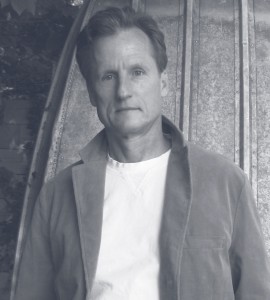
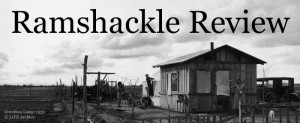 Fall has arrived, and I’m happy to celebrate by sharing good news. But first, I’d like to acknowledge
Fall has arrived, and I’m happy to celebrate by sharing good news. But first, I’d like to acknowledge 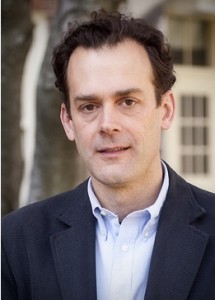 Q (
Q (